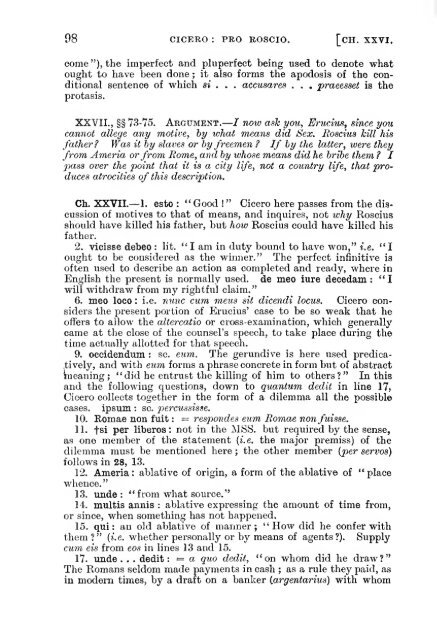Pro S. Roscio Amerino
Pro S. Roscio Amerino
Pro S. Roscio Amerino
Create successful ePaper yourself
Turn your PDF publications into a flip-book with our unique Google optimized e-Paper software.
98 CICERO : PRO ROSCIO. [CH. XXVI.<br />
come "), the imperfect and pluperfect being used to denote what<br />
ought to have been done ; it also forms the apodosis of the conditional<br />
sentence of which si . . . accusares . . . praeesset is the<br />
protasis.<br />
XXVII., §§ 73-75. Argument.—I noiv asJc ymi, Erucius, since you<br />
cannot allege any motive, by what means did Sex. Hoscius hill his<br />
father? Was it hy slaves or byfreemen ? If by the latter, were they<br />
from Ameria orfroni Rome, and by whose means did he bribe them ? I<br />
pass over the point that it is a city life, not a country life, that produces<br />
atrocities of this description.<br />
Ch. XXVII.—1. esto : " Good ! " Cicero here passes from the discussion<br />
of motives to that of means, and inquires, not why Roscius<br />
should have killed his father, but how Roscius could have killed his<br />
father.<br />
2. vicisse debeo : lit. "I am in duty bound to have won," i.e. "I<br />
ought to be considered as the winner." The perfect infinitive is<br />
often used to describe an action as completed and ready, where in<br />
English the present is normally used. de meo iure decedam : "I<br />
will withdraw from my rightful claim."<br />
6. meo loco : i.e. minc cum meus sit dicendi locm. Cicero considers<br />
the present portion of Erueius' case to be so weak that he<br />
offers to allow the altercatio or eross-examination, which generally<br />
came at the close of the counsel's speech, to take place during the<br />
time actually allotted for that speech.<br />
9. occidendum : sc. eum. The gerundive is here used predieatively,<br />
and with eu7n forms a phrase concrete in forra but of abstract<br />
nieaning ; "did he entrust the killing of him to others?" In this<br />
and the following questions, down to quantum dedit in line 17,<br />
Cicero colleets together in the form of a dilemma all the possible<br />
cases. ipsum : sc. percussisse.<br />
10. Romae non fuit : =<br />
respondes eum Romae nonfuisse.<br />
11. fsi per liberos: not in the MSS. but required by the sense,<br />
as one member of the statement {i.e. the major premiss) of the<br />
dilemma must be mentioned here ; the other member (per servos)<br />
follows in 28, 13.<br />
12. Ameria: ablative of origin, a form of the ablative of "place<br />
whence.<br />
"<br />
13. unde : "from what source."<br />
14. multis annis : ablative expressing the amount of time from,<br />
or since, when something has not happened.<br />
15. qui: an old ablative of manner ; " How did he confer with<br />
them ?" {i.e. whether personally or by means of agents?). Supply<br />
cum eis from eos in lines 13 and 15.<br />
17. unde . . . dedit : = a quo dedit, "on whom did he draw?"<br />
The Romans seldom made payments in cash ; as a rule they paid, as<br />
in modem times, by a draft on a banker {argentarius) with whom

















